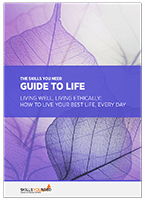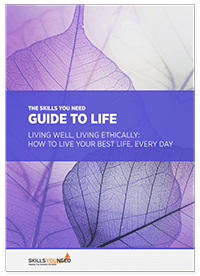Gratitude - Being Grateful
See also: GenerosityGratitude is a warm feeling of thankfulness towards the world, or towards specific individuals.
The person who feels gratitude is thankful for what they have, and does not constantly seek more.
Unfortunately, for many of us, gratitude is tied up with more complex feelings, perhaps as a result of having to write thank-you letters as a child, or to say thank you for things that we didn’t want.
This makes it harder to establish when gratitude should be felt or expressed, and also often makes us feel awkward rather than grateful.
What is Gratitude?
gratitude n. warm and friendly feeling towards a benefactor: thankfulness.
Chambers English Dictionary, 1988 edition.
The word ‘gratitude’ comes from the Latin word gratus, meaning pleasing or thankful.
In its broadest sense, then, it is simply a feeling of thankfulness. In common usage, gratitude may be either:
Specific - gratitude could be directed towards someone or something specific, who has done something good for us, perhaps given us a gift; or
General - gratitude could be a warm feeling towards the world, or towards a deity, for everything in life.
This concept of being grateful to a deity crops up in several world religions, for example, in the Christian concept of saying ‘grace’ before meals.
For what we are about to receive, may the Lord make us truly grateful.
Traditional Christian children’s grace.
The Right Time for Gratitude
When is it right to feel and to express gratitude?
This isn’t just a philosophical question, unfortunately, but one which has applications every day and can also be extremely difficult to resolve, especially if there is a clash between how you actually feel, and how you think you should feel, or how politeness dictates you should behave.
Do you think you should feel and/or express gratitude in the following situations:
You have been given a gift of something that you really like by a friend or relative.
Hopefully your answer is that you should both feel and express gratitude!
Your eccentric aunt gives you a very strange gift (perhaps an item of clothing that you'll never wear, or a book by an author that you actively dislike).
You should certainly express gratitude: she has given you a gift, even if it wouldn’t have been your first choice. You can always pass it on to someone else later if you don’t want it. You should probably also try to feel gratitude – for the trouble and time she has spent, if not for the actual gift.
You win some money on the lottery.
Who is there to be grateful to? But on the other hand, you can’t claim that you deserved to win the lottery, because nobody does. Feelings of gratitude towards a benign world would be graceful.
In the course of an interaction with your bank, someone there has been very helpful. They were only doing their job, but it has made your life much easier.
Again, feeling gratitude would be graceful. Expressing it would also be graceful because it may help the person who helped you to feel that their job is worthwhile and make them more likely to do it again, whether to you or someone else.
Your life is good. You are generally happy, you have lovely children, and a rewarding job.
You may feel that you have earned this. You have worked hard for your success, and there is nobody to thank but yourself. Alternatively, you may feel grateful that your hard work has been rewarded. Other people will probably respond better to the latter!
Our page Balancing Politeness and Honesty discusses this issue more generally.
Looking at the situations described, a common theme starts to emerge:
Feeling and expressing gratitude is graceful, or virtuous.
In other words, gratitude shows that you do not take things for granted.
Although we are constantly urged by advertisers that ‘You deserve it’, actually being around people who are always saying that they deserve more is quite wearing. Self-esteem and feeling good about yourself is one thing, but expressing gratitude for the good things that you have is a sign that you don’t expect the world to provide for you.
But you do have to sound like you mean it and, for most of us, that means that you actually have to mean it. Most people find it quite easy to detect hypocrisy and generally don’t like it.
The crucial aspect may be to consider what you are grateful for and why. For example, you may not like Auntie Nellie’s gift, but you are genuinely grateful that she has bothered to buy it, wrap it and give it to you. You can thank her warmly for the trouble she has taken, and both sound, and be genuine. Try to thank her for the gift itself though and you may well find yourself sounding and feeling awkward and ‘fake’.
Low Self-Esteem?
If you genuinely don’t feel that you deserve to have any good things happen to you, you may be suffering from poor self-esteem. You may want to talk to a friend or professional about this.
Also see our page on Improving your Self-Esteem.
The Benefits of Gratitude
Someone who is grateful is the polar opposite of the person who feels that they are owed something by the world. They have the gift of enjoying and valuing what they have, which makes them rewarding friends and companions.
But gratitude also has more practical benefits.
Research shows that people who are grateful tend to show higher levels of well-being and happiness (in other words, they feel better about themselves and their lives), and improved mental health. They may even sleep better!
Expressing gratitude to those who have given us something, whether that is out of the goodness of their hearts or in the line of duty, also helps them to feel good, and improves their self-esteem.
Gratitude has been shown to improve social ties and promotes more social behaviour. It makes other people want to show gratitude too, a phenomenon known as ‘upstream reciprocity’. Grateful people tend to want to repay favours, and not just to the person who did them the favour but to other people as well.
So feeling and expressing gratitude helps you and those around you to feel good, and that tends to result in the good feelings being spread even further.
Further Reading from Skills You Need
The Skills You Need Guide to Life: Living Well, Living Ethically
Looking after your physical and mental health is important. It is, however, not enough. Maslow’s famous hierarchy of needs suggests that most of us need more than that. We need to know that we are living our ‘best life’: that we are doing all we can to lead a ‘good life’ that we will not regret later on.
Based on some of our most popular content, this eBook will help you to live that life. It explains about the concepts of living well and ‘goodness’, together with how to develop your own ‘moral compass’.
A little gratitude can go a long way...
Many people suggest that they feel awkward expressing gratitude. However, being able to say thank you to others nicely is a strong social skill. It may require some work, particularly in thinking about why you are grateful so that you can be genuine in what you say. But done well, it will draw people to you and help to make you a good friend.
Gratitude is a skill that is well worth cultivating, a skill you need.


